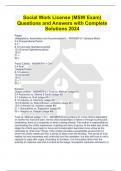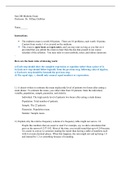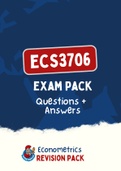Social Work License (MSW Exam)
Questions and Answers with Complete
Solutions 2024
Piaget
(Adaptations, Assimilation and Accommodation) - ANSWER-0-1 Sensory-Motor
2-4 Preoperational Period
5-7 "
8-12 Concrete Operations period
13-18 formal Operations period
19-21
21 +
50 +
Freud (Libido) - ANSWER-0-1 Oral
2-4 Anal
Oedipal/Phallic
8-12 Latency
13-18 Genital
19-21 "
21+ "
50 + "
Erickson
(Stage conflict) - ANSWER-0-1 Trust vs. Mistrust (stage #1)
2-4 Autonomy vs. Shame & Doubt (stage #2)
5-7 Initiative vs. Guilt (stage #3)
8-12 Industry vs. Inferiority (stage #4)
13-18 Identity vs. Role Diffusion, confusion (stage #5)
19-21 Intimacy Vs. Isolation (stage #6)
21 + Generativity vs. Stagnation (stage #7)
50 + Integrity vs. Despair (stage #8)
Trust vs. Mistrust (stage 1) 0-1 - ANSWER-During infancy (0-1) the child is dependent
on mother for food and care. As the child incorporates or takes in through sucking and
swallowing; there is a receptivity to what is being offered. The mother is responsible for
coordinating the child's experience of getting and hers of giving. At the latter part of this
stage the child's eyes begin to focus and incorporation becomes more active as the
child bites to "hold onto" things. If the mother provides a predictable environment in
which the child's needs are met, a sense of basic trust will develop. This sense of trust
implies not only sameness and continuity from the caretaker, but also self-trust in one's
capacity to cope with urges. According to Erickson, it is the quality rather than the
quantity of maternal care that is critical at this stage. Successful resolution will lead to a
,lasting ego quality of hope, an enduring belief that wishes can be fulfilled. Unsuccessful
resolution will lead to a sense of mistrust in other people and the environment.
Autonomy vs. Shame and Doubt (stage 2) 2-3 - ANSWER-During early childhood (2-3)
the child learns a sense of autonomy through retention and elimination of urine and
feces. As the child's muscles mature to the point that bodily wastes can be retained or
expelled at will, the child experiments with two simultaneous social modalities "holding
on" and "letting go." Parents must be firm and tolerant so that the child can gradually
learn bowel and bladder control and a "sense of self-control without loss of self esteem."
From this emerges a sense of autonomy and pride, and the lasting ego quality of WILL
POWER, the determination to use free choice and self-restraint. Unsuccessful
resolution of this stage will lead to lifelong feelings of shame and doubt.
Initiative vs. Guilt (stage 3) 3-5 - ANSWER-During the play age (3-5), increased
locomotor mastery (walking and running) gives the child a wider radius of goals. In
addition, language skills add to the ability to imagine "so many things he cannot avoid
frightening himself with what he himself has created and thought up." The Oedipal
wishes and the ambivalent feelings that accompany them must be repressed in order to
temporarily mask the initiative toward the opposite sex parent. While this initiative is a
prerequisite for masculine and feminine behaviors later in life, it is now repressed of
necessity-in order to avoid the guilt that would accompany knowledge of incestuous
thoughts. Parents assist the child in learning appropriate roles, including gender roles,
as the child diverts the sexual drive into acceptable activities. At this point conscience,
or superego, becomes established to govern the initiative. Proper resolution of this
stage leads to a lasting ego quality of purpose, the courage to pursue goals.
Unsuccessful resolution leads to feeling of shame.
Industry vs. Inferiority (stage 4) 6-12 - ANSWER-The child now enters the school age
(6-12) and is enmeshed in the "world" of school and opportunities for new types of
mastery. As children develop their abilities in new skills and tasks, they desire
recognition gained from producing things. Through this, they develop a sense of
industry and a lasting ego quality of competence. Unsuccessful resolution of this stage
leads to life long feelings of inferiority and inadequacy.
Identity vs. Role Confusion (stage 5) 12-18 - ANSWER-As the child approaches
adolescence (12-18 or so), physical and hormonal changes mark the beginning of
puberty. Rapid growth and physical genital maturity disrupt the earlier continuity of
childhood. This stage is perhaps the most important for Erikson, as the adolescent must
now forge a lasting ego identity through aligning his or her basic dries, endowments,
and opportunities. A sense of ego identity is "the accrued confidence that ones ability to
maintain inner sameness and continuity...is matched by the sameness and continuity of
ones meaning for others. Thus, self-esteem grows to be a conviction that one is
learning effective steps toward a tangible future, that one is developing a defined
personality within a social reality which one understands. As the adolescent struggles to
integrate past and future views of self and begins to define new appropriate sex roles,
an identity crisis may emerge from this confusion. New expectations from parents may
,add to this stress. Tolerance, understanding, and guidance in the home can assist the
adolescent in achieving an integrated identity. Unsuccessful resolution can result in
either role confusion or identity diffusion, a state in which the individual is left with strong
doubts about who he or she "is." This may lead to delinquency, psychotic incidents, or
over-identification with others. Youths who emerge with a strong sense of identity and
individuality gain a lasting ego quality of fidelity or freely pledges loyalties.
Intimacy vs. Isolation (stage 6) (early to late 20s) - ANSWER-Young adulthood (early to
late 20s) brings an end to the years of childhood and youth. It is now time for choosing a
career, socializing with the opposite sex, and eventually marriage and raising a family.
Interpersonal intimacy is the task of this stage, encompassing both psychological and
sexual intimacy. Failure to achieve intimacy leads to isolation, an inability to develop
intimate and meaningful relationship. The person who cannot be intimate will likely be
self-absorbed. Proper resolution of this stage leads to a lasting ego quality of love, or
mutuality of devotion.
Generativity vs. Stagnation (stage 7) (late 20s-50s) - ANSWER-During adulthood (last
20s-50s), maturity geniality (in the Freudian sense) leads to procreation and
establishing guidance for the next generation. those who do not apply this to their own
offspring must sublimate and find outlets in altruistic activities. According to Erikson,
simply wanting or having children is insufficient for completion of this stage. Rather, an
active role and a "belief in the species" leads to efforts to make the world a better place
for future generations. Unsuccessful resolution of this stage results in a sense of
stagnation or self-indulgence that reflection interpersonal impoverishment. Successful
resolution of this stage can be seen in the lasting ego quality of care, or concern for
others.
Integrity vs. Despair (after 50) - ANSWER-Late adulthood (after 50) is a period of
retrospective reflection about one's own life and acceptance of the eventual end of life.
If, at the end of the life cycle, one can accept responsibility for past choices and find
meaning and contentment in the road that was traveled, a sense of integrity is achieved.
Unsuccessful resolution of this stage leads to a sense of despair. This may be exhibited
as disgust and anger at external sources but is an indication of self-contempt. The
lasting ego quality that emerges from proper resolution of this stage is wisdom.
Sensorimotor (0-2 yrs) (Stage 1) - ANSWER-Reflex activity (0-1 months) Learns to suck
/ tracks moving object but ignores its disappearance.
Primary circular reactions (1-4 months) Repetitive movements; opesn and closes fist;
moves thumb to mouth; moves hand and watches it. Looks at spot where object
disappeared.
Secondary circular reactions (4-8 months) Imitates own sounds if made by someone
else; repeats movements that have an effect. Searches for a partly concealed object.
, Coordination of secondary schemes (8-12 months) Imitates new sounds; moves objects
that are in the way. Searches for an object in the last place it was found.
Tertiary circular reactions (12-18 months) Drops objects to see effect; reaches a toy by
pulling an extension of it. Searches for and finds objects that are hidden while watching.
Invention through mental combinations (18-24 months) Can evoke memories not linked
to perception; experiments are done internally. Searches for and finds objects that are
hidden out of sight. Object constancy is complete.
Peroperational (2-7 yrs) (Stage 2) - ANSWER-Preconceptual (age 2-4) Language;
symbolic thought; pretend play; conscious of self as an object. Can mentally visualize
things that are not present.
Intuitive (age 4-7) Centers on one thing at a time; thinking is confined to momentary
perceptions.
Concrete Operations (7-11 yrs) (Stage 3) - ANSWER-Reasoning and logical thought
begin; is able to perform reverse operations mentally; exhibits conversation, seriation,
classification; transitivity; centers on more than one thing at a time; remembers changes
that have taken place.
Formal operations (11-15 yrs) (Stage 4) - ANSWER-Hypothetical deductive reasoning;
combinational thought
Kohlberg's stages of MORAL Development - ANSWER-Level #1 Pre-conventional -
controls are external. Rewards and punishments.
1. Punishment/obedience: Decisions concerning what is good/bad are made to avoid
punishment
2. Naive Instructional Hedonism: Rules are obeyed in order to receive rewards. Often
favors are exchanged.
Level #2 Conventional (role conformity) The opinions of others become important.
Behavior is governed by conforming to social expectations.
3. Good boy/girl morality: Good behavior is considered to be what pleases others. There
is a strong desire to please and gain the approval of others.
4. Authority-Maintaining Morality: The belief in law and order is strong. Behavior
conforms to law and higher authority. Social Order is important.
Level #3 Post-conventional Moral decisions are finally internally controlled. MOrality
involves high lever principals beyond law and even beyond self-interest.
5. Morality of Contract: Laws are considered necessary. HOwever, they are subject to
rational thought and interpretation. Community welfare is important.
6. Morality of individual Principles & Conscience: Behavior is based on internal ethical
principles. Decisions are made according to what is right rather than what is written into
law.






